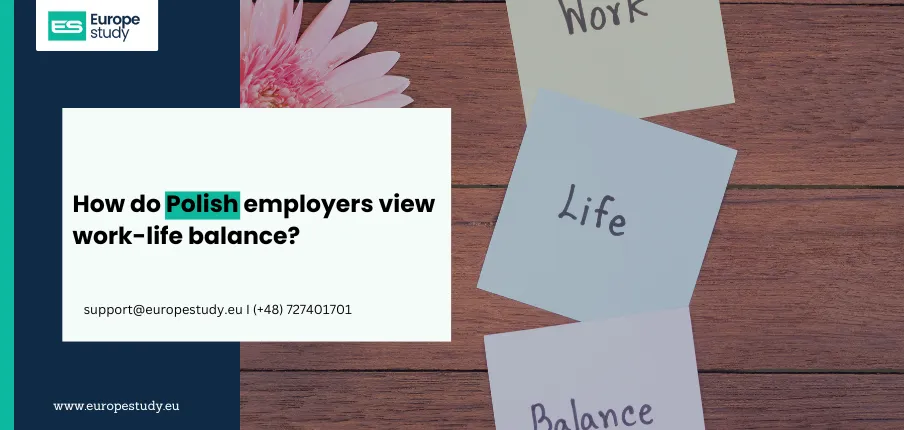
How do Polish employers view work-life balance?
Poland has become an increasingly attractive destination for international professionals, digital nomads, and remote workers. As the economy grows and diversifies, many are curious not only about job opportunities but also about the work culture—particularly when it comes to work-life balance.
In this post, we explore how Polish employers view work-life balance, how it compares to other countries, and what employees can realistically expect when working in Poland.
1. The Traditional vs. Modern Divide
Poland’s attitude toward work-life balance is evolving. Traditionally, the culture placed a strong emphasis on hard work, long hours, and hierarchical workplace structures. However, this is gradually changing—especially among younger generations and in modern sectors like IT, finance, and shared services.
- Traditional sectors (e.g. manufacturing, public administration) may still favor longer hours and a more rigid schedule.
- Modern sectors (e.g. tech, marketing, international corporations) are increasingly adopting Western-style flexibility and remote work models.
The type of company you work for—its size, industry, and whether it is locally owned or international—plays a major role in determining the work-life balance you will experience.
2. Working Hours and Overtime Culture
The standard full-time workweek in Poland is 40 hours, typically spread over five 8-hour days, from Monday to Friday. The legal limit for overtime is no more than 150 hours per year, unless otherwise agreed in a collective labor contract.
Reality Check:
- In some traditional companies, working beyond standard hours is common, though not always explicitly required.
- Startups and tech companies are more likely to support flexible hours and remote work.
- Many international firms in Poland offer "core hours", where employees must be available, but allow flexible start and end times.
3. Paid Time Off and Holidays
Polish law mandates a minimum of 20 to 26 days of paid annual leave, depending on years of service. There are also 13 public holidays, many of which are strictly observed.
Employers generally respect vacation time, and it’s common for people to take extended holidays during the summer or over Christmas. Unlike in some high-pressure work cultures, taking your full vacation is expected, not frowned upon.
4. Remote Work and Hybrid Models
Since the pandemic, many Polish companies—especially in major cities like Warsaw, Kraków, and Wrocław—have embraced remote or hybrid work setups.
- Hybrid models are now widely accepted in the private sector, particularly in IT and finance.
- Remote-first companies exist but are still less common than in countries like Germany or the Netherlands.
- Some firms still prefer employees to be in the office regularly, citing collaboration and productivity concerns.
Remote work is more accessible in urban areas and less common in smaller towns or traditional industries.
5. Family and Personal Life
Poland places a high cultural value on family and personal life, and this is reflected in some employment practices:
- Parental leave is generous compared to many countries. Mothers can take up to 20 weeks of paid maternity leave, and fathers are entitled to paternity and parental leave as well.
- Many companies are supportive of parents, offering flexible hours, part-time options, or work-from-home arrangements during early childhood years.
- While childcare infrastructure is still developing, larger cities tend to have more resources for working parents.
6. Mental Health and Well-Being
Awareness of mental health in the workplace is growing in Poland but still catching up to Western standards.
- Large international firms often offer Employee Assistance Programs (EAPs), mental health days, and wellness initiatives.
- Local companies may not yet prioritize mental health unless they are part of a larger HR transformation.
- Burnout is a recognized issue, especially among younger professionals and in high-pressure fields.
That said, the conversation around work-related stress is becoming more open, especially among younger workers who expect better support and flexibility.
7. Cultural Expectations: Boundaries and After-Hours Work
Poles are generally respectful of private time, and after-hours communication is less common than in some countries. It's not typical to receive work emails late at night or to be expected to respond while on vacation.
However, some roles—especially client-facing or deadline-driven positions—may require occasional availability outside regular hours. In such cases, expectations are usually made clear in advance.
8. City-by-City Differences
Work-life balance can vary significantly depending on where you live and work in Poland:
- Warsaw: Fast-paced and career-driven. Offers flexibility but can be demanding.
- Kraków and Wrocław: Balanced mix of international business presence and a more laid-back local culture.
- Smaller towns: More traditional values, with less flexibility but often a slower pace of life.
Choosing the right location can influence your work-life experience as much as the job itself.
Conclusion
Work-life balance in Poland is improving, especially in international and modern sectors. While some traditional expectations remain—particularly around formality and dedication—many employers now recognize the importance of flexibility, mental well-being, and personal time.
If you're considering a move to Poland or exploring local job opportunities, researching the specific company culture and industry norms is key. Asking about work-life balance during interviews is not only acceptable—it’s smart and increasingly expected.
With the right fit, Poland can offer a balanced lifestyle with access to career growth, cultural richness, and time for personal fulfillment.





